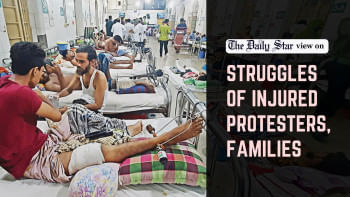We are not doing enough for the injured

The price that citizens had to pay to oust Sheikh Hasina's autocratic regime, not just in terms of the lives lost but also the sheer number of injuries, is stupefying. According to a recent report, more than 500 people, mostly in their prime age, have been fully or partially blinded by pellets of shotguns that law enforcers used on protesters during the July-August uprising. Despite repeated surgeries, many of the injured reportedly have no hope of regaining their eyesight. In some cases, the pellets penetrated so deep that removing those would require the removal of the eye altogether.
All this has meant extended hospital stays for many victims, taking a toll not just on their mental health but also on the financial and emotional state of their families. We appreciate the interim government's announcement yesterday to provide cash assistance to families of the victims, including the injured within a week. While hospital fee waivers have been helpful, patients need money to buy certain medicine and have tests done in private clinics. Plus, lengthy hospital stay means rising costs of food and accommodation for the attendants, especially those travelling from different districts.
Many of the wounded come from impoverished backgrounds. For them to bear treatment and attendance related expenses over a long period is not just difficult; it is literally putting them into debt. We have written about this issue before, and urge the government to prioritise and expedite the cash disbursement, if necessary, in phases.
The government should also start putting in motion its rehabilitation plans for the injured, who will need assistance to rebuild their lives. An overall change is also required to integrate these individuals back into a society where persons with disabilities are often looked down upon and have little infrastructural support. Also, laws related to the use of less-lethal weapons such as pellet shotguns in policing must be reviewed, keeping in mind an Amnesty International finding that these so-called less-lethal weapons injure not only protesters but also bystanders causing permanent impairment, which explains the high number of wounded in the July-August uprising.
Follow The Daily Star Opinion on Facebook for the latest opinions, commentaries and analyses by experts and professionals. To contribute your article or letter to The Daily Star Opinion, see our guidelines for submission.


 For all latest news, follow The Daily Star's Google News channel.
For all latest news, follow The Daily Star's Google News channel. 




Comments